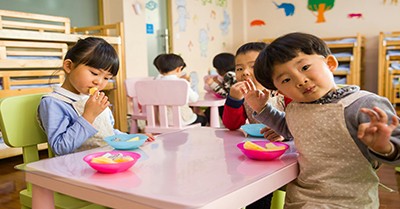Gratitude songs before meals are more than just cheerful tunes; they’re rituals that nurture mindfulness, community, and appreciation in young children. By singing together, children learn to pause, acknowledge the effort behind their food, and celebrate the connections between nature, family, and community. These songs can be simple, repetitive, and symbolic, making them accessible for toddlers while still meaningful for older preschoolers.
Examples of Gratitude Songs
1. WeeSing: Thank You, Food
- Excerpt: “Thank you for the food we eat, / Thank you for the friends we meet…”
- Gentle rhythm, ideal for toddlers.
- Focus: food, friendship, care.
- Watch the full mealtime gratitude song on YouTube
2. Earth, Who Gives to Us This Food (Waldorf-inspired)
- Excerpt: “Earth who gives to us this food, / Sun who makes it ripe and good…”
- Sung slowly with reverence.
- Focus: nature, interconnectedness.
- Full verse and blessing text on Daily Wonder – Waldorf Meal Blessings
3. I Am Thankful
- Excerpt: “I am thankful for my family, / I am thankful for my food…”
- Upbeat, affirming, and group-friendly.
- Focus: family, gratitude, joy.
- Full performance video on YouTube
4. Gratitude Song – Sing Along
- Excerpt: “I’m thankful for the food that’s on my plate, / The roof over my head, it’s really great…”
- Joyful, easy to learn.
- Focus: appreciation for shelter, food, and care.
- Watch the sing-along version with lyrics on YouTube
Additional Examples & Adaptations
5. Reggio-Inspired Gratitude Verse (Reconstructed)
- “I have a roof on my house, / And two windows to see…”
- Symbolic imagery: roof, bees, honey, hands that made the food.
- Focus: gratitude for everyday blessings.
6. Multicultural Fusion Gratitude Song (adaptable)
- Verse ideas:
- “Gracias for the sunshine, / Merci for the rain…”
- “Dhanyavaad for the farmers, / Thank you once again…”
- Focus: inclusive language, cultural motifs.
7. Gesture-Based Gratitude Chant (Auslan or Baby Sign)
- Simple hand signs for food, sun, water, thank you.
- Children can “sing” with their hands, making it accessible for infants and diverse learners.
8. Nature Gratitude Call-and-Response
- Educator: “Who gives us honey?”
- Children: “The bees!”
- Educator: “Who makes the food grow?”
- Children: “The sun and rain!”
- Focus: interactive, playful, reinforcing ecological awareness.
9. Seasonal Gratitude Verses
- Autumn: “Thank you leaves for falling down, / Blanketing the ground in brown…”
- Spring: “Thank you blossoms, pink and white, / For bringing joy and light…”
- Focus: connecting gratitude to cycles of nature.
Fusion Gratitude Song
Verse 1 – Home & Shelter
I have a roof on my house.
Two windows to see,
The sky and the trees,
And the birds flying free.
Verse 2 – Nature’s Gifts
Thank you bees for honey,
Thank you sun for light,
Thank you hands that made this food,
With love and care so right.
Verse 3 – Multicultural Gratitude
Gracias for the sunshine,
Merci for the rain,
Dhanyavaad to the farmers,
Thank you once again.
Verse 4 – Water & Earth
I’m grateful for the water,
The soil and the seed,
For every little kindness,
And all I truly need.
Closing Verse – Shared Joy
Thank you for this meal,
And the joy we share today,
Let’s eat with gentle hearts,
In a peaceful, thankful way.
Suggested Auslan Gestures
- Roof/House → Hands form a triangle above the head.
- Sun → Circle drawn in the air.
- Bees/Honey → Fluttering fingers near cheeks.
- Hands that made this food → Gesture of mixing or serving.
- Water → Wavy hand motion.
- Thank you. → A flat hand moves forward from the chin.
Practical Uses in Early Childhood Settings
- Mealtime Rituals: Short songs before snacks or lunch to create calm transitions.
- Family Engagement: Share simple gratitude songs with families to extend rituals at home.
- Inclusive Practice: Offer multilingual or gesture-based versions to ensure all children can participate.
Further Reading
Teaching Gratitude To Children
Implementing The Kindness Curriculum For Preschoolers
Descriptive Praise and Appreciative Praise
The Kindness Curriculum
Progressive Mealtimes In Early Childhood Settings
